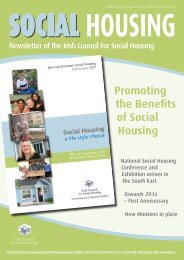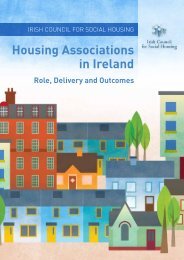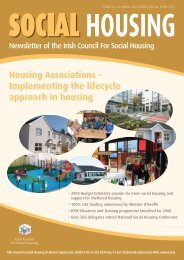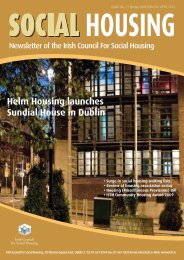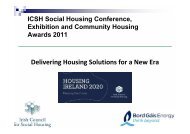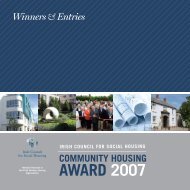National Housing Strategy for People with a Disability 2011 - 2016
National Housing Strategy for People with a Disability 2011 - 2016
National Housing Strategy for People with a Disability 2011 - 2016
Create successful ePaper yourself
Turn your PDF publications into a flip-book with our unique Google optimized e-Paper software.
5.23 Furthermore, a major role is envisaged <strong>for</strong> the voluntary and cooperative sector inthe roll-out of the leasing initiative. A number of proposals have been submitted byapproved housing bodies which would see them take on unsold units from developers on astraight<strong>for</strong>ward lease basis or purchase unsold units from developers / financial institutionsand then lease these to a local authority <strong>for</strong> use as social housing.5.24 The <strong>Housing</strong> Finance Agency (HFA) has put a mechanism in place allowing approvedhousing bodies direct access to HFA finance. Approved housing bodies will be able to buildor acquire new social housing, using leasing payments from the Department to service theirborrowings. At the end of the loan period the approved housing body will own the unitswhich will either continue to be made available <strong>for</strong> social housing purposes or may be soldto sitting tenants.5.25 The Government’s new <strong>Housing</strong> Policy Statement (June <strong>2011</strong>) recognises a moreprominent and active role <strong>for</strong> the voluntary and cooperative housing sector. The use of loanfinance (from both commercial lending institutions and the <strong>Housing</strong> Finance Agency) has thepotential to develop a stronger, more sustainably funded voluntary and co-operative housingsector, playing a much more active role in the supply of social housing <strong>with</strong>out reliance oncapital funding from the Exchequer. It also has the potential to further promote theevolution of mixed tenure communities through the provision of housing <strong>for</strong> market sale andrent as well as social renting and will offer a new path to ownership via sales to tenantsunder incremental purchase arrangements.Voluntary <strong>Housing</strong> and <strong>People</strong> <strong>with</strong> Disabilities5.26 The voluntary housing sector plays a significant role in the provision of social housingin partnership <strong>with</strong> local authorities. It is a key provider of social housing to people <strong>with</strong>disabilities and many housing associations also offer non housing and related services totenants such as social activities, meals and support staff. In recent years there has been amarked increase in the use of CAS by organisations providing accommodation <strong>for</strong> people<strong>with</strong> intellectual and mental health disabilities. In 2010 the Irish Council <strong>for</strong> Social <strong>Housing</strong>(ICSH) worked <strong>with</strong> 83 member organisations providing housing solely to people <strong>with</strong>disabilities. This group of organisations has a total of 2,334 units. A further 59 ICSHmember organisations cater <strong>for</strong> people <strong>with</strong> disabilities in conjunction <strong>with</strong> other categories.While, it can be difficult to distinguish the level of provision <strong>for</strong> people <strong>with</strong> various typesdisabilities <strong>for</strong> most of these organisations, there are 2 that can be specified:• St. John of God’s Trust – 233 units <strong>for</strong> people <strong>with</strong> an intellectual disability; and• HAIL – 116 special needs units <strong>for</strong> people <strong>with</strong> mental health disabilities.55



